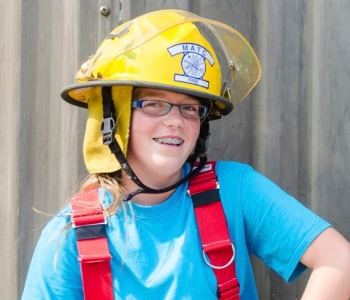How to Build Community Partnerships with Your Troop

Do your Girl Scouts have a long list of what they’d like to achieve this coming year? And are you, troop leader, anxiously wondering how you’ll help them make it all happen?
Luckily, you don’t need to do it all on your own. In fact, you’ve got a powerful ally at your side: your community!
Building relationships with community partners is an enriching experience for your troop; partners give your girls opportunities to discover new interests and get to know their community in a different way. And it doesn’t end there: these relationships also deepen their connection to the world around them and show them firsthand how they can pay it forward.
“I discovered that sometimes the best partnerships aren’t the ones that are transactional, such as a fee-based workshop, but, rather, those that are relationship driven,” says Denise Montgomery, a troop leader with Girl Scouts of San Diego.
So how do you get started? Our Volunteer Experts broke down the simple steps you can take to cultivate successful community partnerships.
Make the connection. Sometimes you’ll start with a connection to a community resource—and other times you’ll make cold calls. No matter how you link up, explain who you are and be clear about your partnership goals. “People need to be able to see themselves helping, and by giving them a concrete goal, people [can] visualize themselves helping,” says Nancy Fink, a troop leader at Girl Scouts of Greater Chicago and Northwest Indiana. “It’s also important to be able to speak clearly about why you’re a Girl Scout volunteer, what other adults may gain by working with Girl Scouts, and how Girl Scouting helps girls.”
Plan ahead. Longer lead times are helpful for your community partner; when you and your partner feel prepared, the more successful your event or activity will be! “I recommend reaching out to community members about one to two months in advance of a desired date,” says Cheryl Lentsch, a troop leader with Girl Scouts Spirit of Nebraska.
Look for potential role models. We tell girls they can be or do anything—and you can reinforce that message by introducing them to women in the fields that excite them. “When we scheduled a workshop [with our local science center], we indicated a preference for female science educators, explaining that we aim to inspire girls to explore and feel confident in STEM,” says Denise. “Two outstanding female science educators led the workshop; the girls loved it!”
“Our experience has been that women leaders are happy to share their leadership journey with the troop,” continues Denise. “The sincerity of our interest in cultivating leadership among the girls shines through and leaders make time to meet with us.”
Set expectations for partners... “Even our community members who were Girl Scouts as children can be unfamiliar with today’s programming, so we take the time to explain not just the information we’re hoping they’ll share, but how their assistance fits into the greater goals of Girl Scouting,” says Nancy. “For example, we had a general contractor and a cabinetmaker help two teams of girls working on their Silver Awards. Their technical expertise was invaluable, but the experience was more than a chance to learn skills once we explained how the Silver Award is earned, what the girls were expected to do and learn, and how this award was meant to prepare them for the Gold Award. Our mentors let the girls fail, encouraged them to plan multiple approaches, and took the time to teach. Without knowledge about the purpose of the award, both mentors could have taken over the project and ensured success, but the girls wouldn’t have achieved nearly as much.”
…and for your girls. “We’ve found that setting an expectation that questions are asked throughout is more engaging for the girls in our troop rather than waiting until the end of a presentation. Sometimes a presentation is more formal and doesn’t lend itself to questions throughout; that’s OK, and it can be helpful to let the girls know ahead of time that there will be an opportunity to ask questions and to encourage them to do so. I also let speakers know ahead of time that the girls may or may not ask a lot of questions and assure partners that the girls will be absorbing what they share.
Partnerships are a two-way street. Though community partners will love things like thank-you notes from your troop or a message board signed by all the girls, take it to the next level! “Reciprocate whenever possible” says Denise. “Invite a community partner to an event such as a Silver Award ceremony or to a council-sponsored event that might be of interest to the partner.”
Remember: your troop has a lot to offer too! “Beyond the ability to pay for a workshop or admission, our troop has multiple things to offer potential community partners: the opportunity to interact with a great group of girls and the sense of connection and community that comes from that, the opportunity to share wisdom they have gleaned along their leadership paths, and to reflect on their experiences,” says Denise. “And for those who were Girl Scouts growing up, the opportunity to share their memories with current Girl Scouts, and the sincere appreciation of our troop.”





